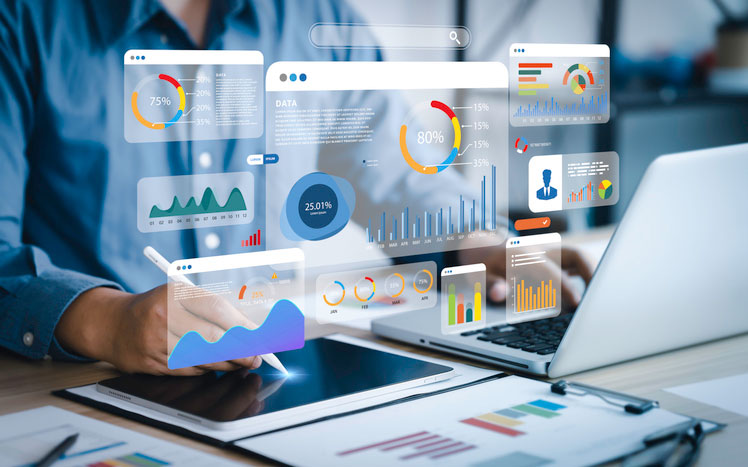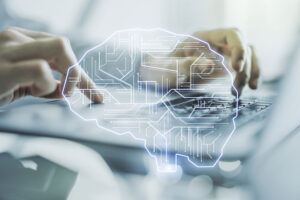Written by Scott Wilson

When all is said and done and the history books are written and slotted up on the library shelves for future generations to learn from, it may be said that accounting is the industry that we have to thank for the success of computers.
Although early computers could be programmed in many ways to do many things, the first clear business application—something that people were willing to pay large sums of money for—was shuffling numbers around.
When big corporations started to install mainframes, it was the accounting department that demanded them. When desktop computing took off in the business world, it was largely due to one key creation: the spreadsheet program, in the form of VisiCalc. The raging demand for VisiCalc, which was developed for the Apple II, was credited with pushing IBM into developing their IBM PC, which flooded the business world two years later.
Now, historians must ask themselves: will artificial intelligence end up owing as much to accounting as computer science? Or will accounting itself end up being completely transformed by artificial intelligence?





Accounting and Computing Are Intimately Linked
The match between the world of accounting and computing goes back even further than the modern sense of the word. A computer was originally a human being: as far back as the 17th century, individuals with strong math skills were used to compile mathematical tables. Companies had entire rooms of human calculators helping with books and inventory.
Those biological computers, of course, were all eventually phased out and replaced by digital computers that could do it all more quickly and more accurately. The role of accounting professionals today is largely in feeding those machines and interpreting the answers.
So you must wonder… with generative artificial intelligence coming down the road, will accountants today once again be replaced by machines?
How Artificial Intelligence Will Change Accounting All Over Again
 The answer is, probably not. But the profession may find itself changed even more than it was by the introduction of computers in the first place.
The answer is, probably not. But the profession may find itself changed even more than it was by the introduction of computers in the first place.
Artificial intelligence brings basic reasoning abilities to those computers, allowing them to take on some of the tasks of judgement and decision that previously only could be made by humans.
In accounting, the first places this kind of reasoning skill will be used is in the most basic functions:
- Basic bookkeeping - AI can enter, categorize, match data, and reconcile receipts
- Accounts Receivable - AI will be able to create and send invoices and follow up with customers for payment
- Accounts Payable - Similarly, AI can receive and process bills
In fact, some forms of machine learning are already in use behind major accounting packages that help automatically classify transactions or flag problematic transactions for reference. In the future, those may not get flagged at all; instead, AI will investigate and look for the answers on its own.
AI systems will also go further and into more complex accounting functions.
Dealing with the complications of the ever-changing tax code may be one of the biggest roles for AI in accounting. Assessing and evaluating the books for innovative tax strategies is a good fit for ML algorithms that can explore many scenarios and deal with large amounts of data. They can also ensure compliance with both tax codes and other regulatory requirements.
Similarly, planning and reporting functions in accounting will fall to AI. It will be able to pull insights out of sources that combine both the hard numbers on the books as well as other data from business operations and even on industry trends. Recommendations today that come on the back of hard work by the CFO and teams of staff accountants may rise to the C-suite automatically from observant AI systems.
Auditing is another area where AI seems like to be a big player. It will serve as a watchful eye over transactions and money movement in real time, and with a deep well of expertise in spotting suspicious activities.
Of course, like every other kind of administrative work, accounting will be up-ended by the impressive automation abilities of AI in routine workflow. Client communications, intake forms, customer support, and various research projects will all be taken on by various kinds of AI-powered systems in the near future.
What Kind of Positions Will Be Available for AI Professionals Working in Accounting?
 Many of the jobs that will go into putting together this future vision of accounting will be at the big players in the industry today. That means big software vendors like Intuit, or major consultancies such as KPMG and Deloitte.
Many of the jobs that will go into putting together this future vision of accounting will be at the big players in the industry today. That means big software vendors like Intuit, or major consultancies such as KPMG and Deloitte.
The positions themselves will revolve around AI programming. Not a lot of R&D needs to happen to build out new AI for accounting purposes. Instead, it will mostly be a matter of taking established machine learning systems and figuring out how to apply them as the backend to existing accounting software packages.
That’s classic AI engineering work. Some combination of software engineers and AI engineers will make it happen.
The job titles won’t be much different than those of people who are working on those systems now. In fact, many of those jobs will incorporate the tasks and responsibilities that come along with AI over time.
All Kinds of AI Degree Programs Will Work for Accounting AI Careers
 The sort of education needed to work on AI for accounting doesn’t have to be particularly flashy, either. Although accounting is a big industry, approaching $145 billion in revenues for 2023, it’s one that is based around a skill that every AI degree program includes by default: math.
The sort of education needed to work on AI for accounting doesn’t have to be particularly flashy, either. Although accounting is a big industry, approaching $145 billion in revenues for 2023, it’s one that is based around a skill that every AI degree program includes by default: math.
So everything from a basic Bachelor of Science in Artificial Intelligence to a Master of Science in AI and Machine Learning will be enough to qualify people for accounting AI positions. While many AI jobs in the early days of the field are going to people with graduate degrees, that’s unlikely to be a requirement in the accounting world.
In fact, some of the most important preparation may happen at the undergraduate level. With four years of study and a wide range of available electives, people interested in pursuing AI in accounting careers can pick up some elementary bookkeeping and tax accounting coursework. Classes like:
- Financial Accounting
- Managerial Accounting
- Quantitative Business Tools
- Intermediate Accounting
With some of the basics under their belt, it will be that much easier to train AI how to perform those functions.
Many people already involved in IT in the accounting industry may not have the expertise needed to roll with the AI developments that are coming. But fortunately, educational certificates exist that build on current programming, math, and computer science skills to add on valuable ML and AI knowledge.
A Post-Baccalaureate Certificate in Applied Artificial Intelligence is on example. Taking only a few months to complete, these aren’t in-depth explorations of AI concepts and theory. Instead, they bring a handful of classes that build on existing experience and knowledge to bring students up to speed in ML algorithm design, programming, and implementation.
Does Professional Certification Make a Difference in Accounting AI Careers?
 Accountants like credentials. So professional certifications can be a big deal for building credibility in this field. Information technology has a long history of outpacing the standard college education, and certification has been the best way to ensure that job candidates have the right set of current knowledge and skills for the position.
Accountants like credentials. So professional certifications can be a big deal for building credibility in this field. Information technology has a long history of outpacing the standard college education, and certification has been the best way to ensure that job candidates have the right set of current knowledge and skills for the position.
Unlike educational certificates, professional certifications are less about teaching and more about assessing. Although sometimes there is coursework involved, it tends to be very specific to the certification subject. And these aren’t offered by colleges, but by software vendors and professional organizations, like Google, or the American Institute of Certified Public Accountants.
There are not yet any certifications that are specific to AI and accounting. But there are a handful of AI industry certifications that are becoming important in their own right. And AI professionals interested in working in accounting might consider some types of IT certifications popular in the accounting world, like the Certified Information Systems Auditor from ISACA.
Of course, the full range of actual accounting certifications, from CPA (Certified Public Accountant) on down, are also useful, but most of them require direct accounting experience. Still, anyone with an AI degree who also holds professional certification in accounting will be a formidable resource for building new AI tools in the field.
Those tools are coming soon, and with them will come the answer to whether not accountants and bookkeepers.





